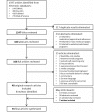Characterizing periodic messaging interventions across health behaviors and media: systematic review
- PMID: 24667840
- PMCID: PMC3978550
- DOI: 10.2196/jmir.2837
Characterizing periodic messaging interventions across health behaviors and media: systematic review
Abstract
Background: Periodic prompts serve as tools for health behavior interventions to encourage and maintain behavior changes. Past literature reviews have examined periodic messages targeting specific behaviors (smoking, physical activity, diet, etc) or media (telephone, email, face-to-face, newsletter, etc) and have found them to be effective in impacting health behavior in the short term.
Objective: Our goal was to review the literature related to periodic messaging and prompts in order to explore typical characteristics, assess the role of prompt timing, identify common theoretical models used, and identify characteristics associated with the effectiveness of periodic prompts.
Methods: Electronic searches of PubMed, PsycINFO, CINAHL, and Web of Science were conducted in October 2012 and May 2013. Database search terms included variant terms for periods, prompts, interventions, media, and health behaviors.
Results: Forty-two of the 55 included research articles found that prompts resulted in significant positive behavioral outcomes for participants. Prompts were delivered via text messages, email, mailed communications, and in a few instances via phone. Generally, the provision of feedback and specific strategies to accomplish behavior change appears to be important for the success of periodic prompts. Rationale for prompt timing was rarely provided, although some studies did organize message content around days of the week or times perceived to be high risk for particular behaviors. Smoking cessation interventions tended to be organized around quit date. Among studies using theoretical models to inform their interventions, the transtheoretical model was most common.
Conclusions: Periodic messaging interventions yield positive results for short-term health behavior changes. Interventions including feedback and prompts that included strategies were more likely to report significantly positive outcomes. Work remains to better understand elements that make periodic prompts successful and whether they are effective in producing long-term outcomes.
Keywords: health behavior; periodic messaging; prompts; review, systematic.
Conflict of interest statement
Conflicts of Interest: None declared.
References
-
- Fry JP, Neff RA. Periodic prompts and reminders in health promotion and health behavior interventions: systematic review. J Med Internet Res. 2009;11(2):e16. doi: 10.2196/jmir.1138. http://www.jmir.org/2009/2/e16/ - DOI - PMC - PubMed
-
- Williams DM, Matthews CE, Rutt C, Napolitano MA, Marcus BH. Interventions to increase walking behavior. Med Sci Sports Exerc. 2008 Jul;40(7 Suppl):S567–73. doi: 10.1249/MSS.0b013e31817c7006. http://europepmc.org/abstract/MED/18562974 - DOI - PMC - PubMed
-
- Cole-Lewis H, Kershaw T. Text messaging as a tool for behavior change in disease prevention and management. Epidemiol Rev. 2010 Apr;32(1):56–69. doi: 10.1093/epirev/mxq004. http://europepmc.org/abstract/MED/20354039 - DOI - PMC - PubMed
Publication types
MeSH terms
LinkOut - more resources
Full Text Sources
Other Literature Sources
Miscellaneous


